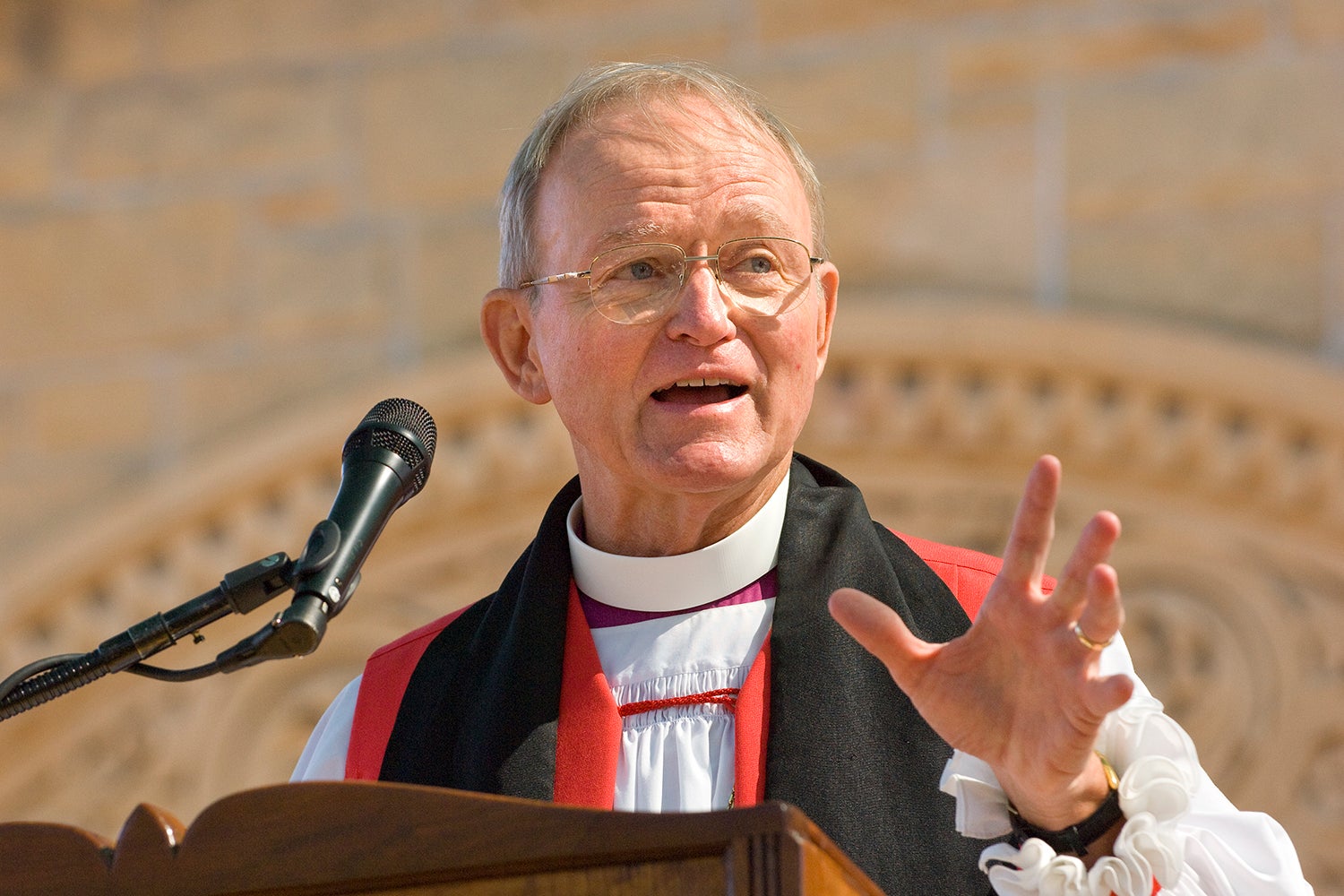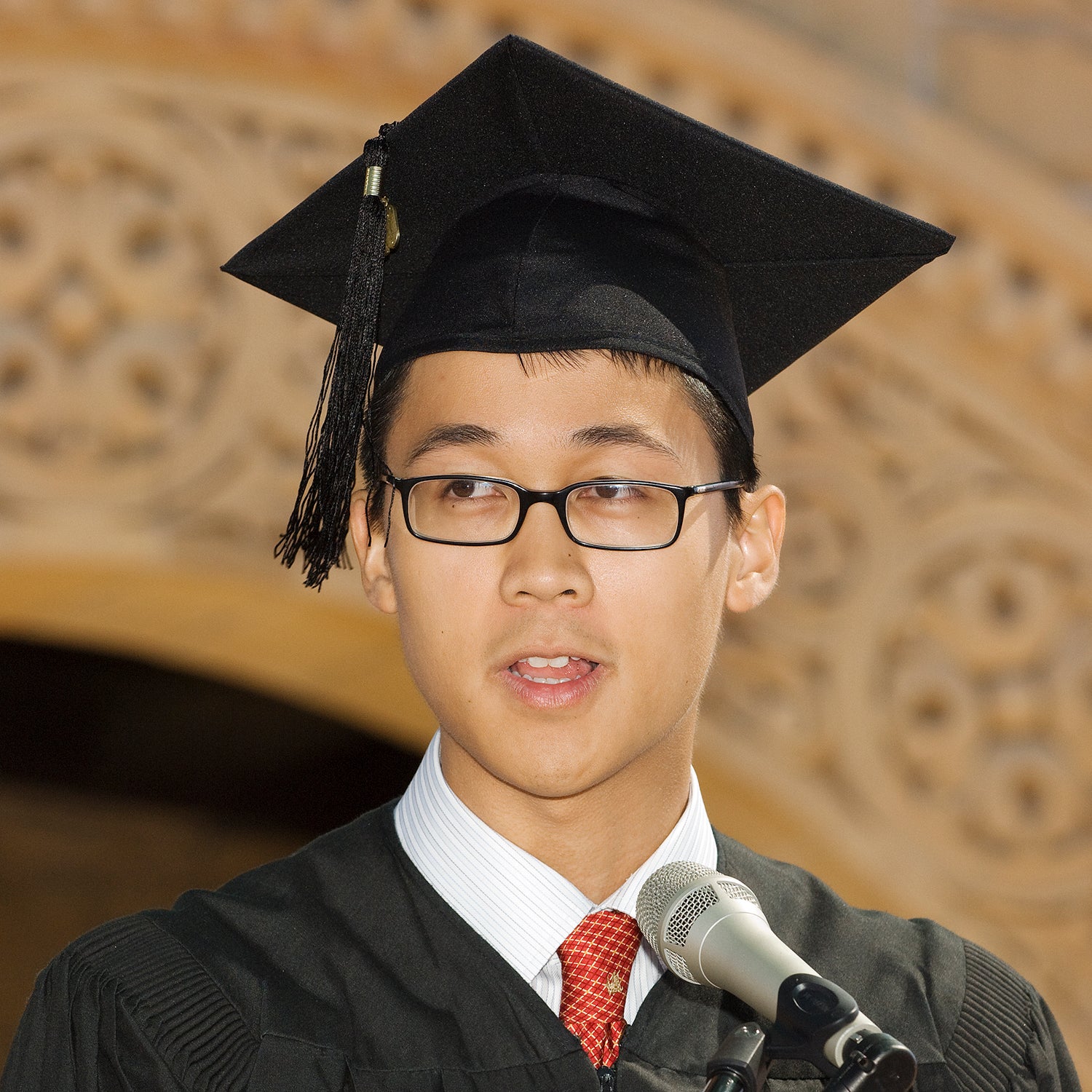Grads advised to ‘stay with the things that draw you like a magnet’
The Rt. Rev. William L. Swing, founder of the United Religions Initiative, advised graduates to work on their own passions, not someone else’s.
The former Episcopal Bishop of California told the Class of 2007 on Saturday that he could talk endlessly about the “significant, brilliant and heroic dimensions” that religions have contributed to ordinary life—and he would be on target.

The Rt. Rev. William L. Swing delivered the address, “Failure, Passion and Gratitude” on Saturday at the Baccalaureate Celebration in the Main Quadrangle at Stanford University. (Image credit: L.A. Cicero)
“But in the face of religiously motivated violence exposed daily in our newspapers, I have to admit there is something radically wrong in the interactions among and between religions,” said the Rt. Rev. William L. Swing, speaking at the Baccalaureate Celebration, a multi-faith gathering that began with a Muslim call to prayer and included readings from the Buddhist, Christian and Jewish traditions, as well as the writings of Mohandas Gandhi.
“The nations of the world have gathered every day for 62 years to struggle together for global good,” Swing told the graduates and their families and friends, who gathered in the Main Quad on a sunny morning for the one-hour service.
“The religions of the world in those same 62 years have not gathered one day to struggle together to pursue global good—never. What do we do about all those other religions that exist throughout the world? Are we going to learn to talk to each other? What do we do about all those religions that seem so foreign to us, so misguided, so potentially dangerous?”
Swing, founder of the United Religions Initiative, an international organization, spends his days now working with Buddhists, Muslims, Hindus, Jews and indigenous tribal peoples who are pursuing peace among competing religions.
“Look at Baghdad,” he said. “When peace among religions breaks down, livable society crumbles.”
Nikki Pareño Serapio, a graduating senior and co-coordinator of Stanford’s chapter of Students Taking Action Now: Darfur, told the audience that his spiritual journey at Stanford was marked by the ongoing genocide in western Sudan.
(According to the United Nations, more than 200,000 people have been killed and at least 2 million have been displaced from their homes since clashes erupted in 2003 between government forces, allied militias and rebel groups in Darfur.)
Serapio, who majored in political science, said students organized a vigil last year on behalf of the people of Darfur. The event attracted more than 5,000 people, who formed a 1.7-mile-long “procession of conscience” on the Golden Gate Bridge.
“Today, many of us continue to fight for the men, the women, the children of Darfur, and we will stay committed to this line of work for however long it’s necessary,” he said.
Serapio said every Stanford Commencement was a variation on a theme called “Do not forget the claims of social justice.” It was a tradition he continued.

Nikki Pareño Serapio, a graduating senior, delivered the student reflection. (Image credit: L.A. Cicero)
“When mass atrocity occurs in Africa, or in Europe, or anywhere, our human dignity is at stake,” Serapio said. “When injustice manifests itself closer to home, our human dignity is at stake. And for every one of us, an essential question will come home sooner or later: How did we use our Stanford education?”
Of course, every baccalaureate celebration requires an eloquent call to graduates to follow their hearts to find their passions—and Swing obliged with an anecdote from his own life.
More than 25 years ago, Swing received an honorary doctorate from his alma mater, Kenyon College, a private liberal arts college in Ohio. The college also honored the director of the Peace Corps and comedian Jonathan Winters. When the group compared notes the night before the ceremony, they realized none of them had been stellar students.
Swing said the faculty encouraged him not to return after his sophomore year. The Peace Corps director lasted one year, and Winters was kicked out during his freshman year.
“We looked at each other in wonder,” he said. “Of all the students who made straight A’s in math and chemistry and political science, why did they invite three dummies to return?”
The trio of honorees realized they had a couple things in common. They had persisted in the face of failure, and they had spent their lifetimes pursuing their passions.
Swing said some people don’t fail until they’re 45 years old—and it devastates them.
“Fail early and get it all over with,” Swing said, a suggestion that elicited surprised laughter from the audience. “If you learn to deal with failure, you can raise teenagers. You can abide in intimate relationships. And you can have a worthwhile career. You learn to breathe again when you embrace failure as a part of life, not as the determining moment of life.”
He advised graduates to work on their own passions, not someone else’s.
“Whether comedy or faith or youthful idealism—whatever, be an apprentice in something that beckons your heart to pursue with endless fascination,” Swing said. “None of us three was an expert in many things, but all three of us were passionate about one thing. Some unique one thing. My advice to you graduates: Stay with the things that draw you like a magnet. Trust your DNA. Pay attention to your daydreams.”
